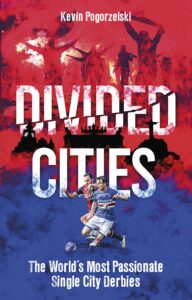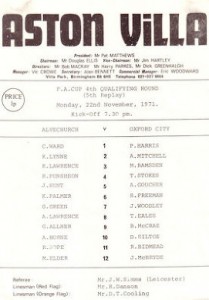Book Review – Divided Cities: The World’s Most Passionate Single City Derbies by Kevin Pogorzelski
 When the football fixtures are published each season, most supporters look for three keys things, firstly, their opening day fixture, secondly the last game of the campaign and of course their ‘derby’ fixtures. This idea of a ‘derby’ can mean different things to different clubs. This maybe because there is not another professional club in a particular city or town, or that even if there is, the teams have rarely crossed paths given they have historically played in different divisions.
When the football fixtures are published each season, most supporters look for three keys things, firstly, their opening day fixture, secondly the last game of the campaign and of course their ‘derby’ fixtures. This idea of a ‘derby’ can mean different things to different clubs. This maybe because there is not another professional club in a particular city or town, or that even if there is, the teams have rarely crossed paths given they have historically played in different divisions.
Kevin Pogorzelski in Divided Cities focuses on eleven single city derbies, with all but two (the Old Firm and Merseyside version) from outside the United Kingdom. As a Liverpool fan, with a regular diet of Premier League football and virtually the same old teams season-in season-out, Pogorzelski yearned for something more and in the books Introduction outlines the premise behind it.
“I became convinced that there was something unmatched about rivalries within the same city, where the people and place live the conflicts daily, which stems from a variety of diverse differences.”
In the table below is a summary of the games he attended which all have a dedicated chapter:
| Name | Translation | Teams | Location | Notes |
| Derby della Lanterna | Derby of the Lantern | Genoa & Sampdoria | Genoa | The Torre della Lanterna is the ancient landmark and the main lighthouse for the city’s port. |
| Derby della Capitale | Derby of the Capital | Lazio & Roma | Rome | Rome is the Italian capital. |
| Derbi da Segunda Circular | See Notes | Benfica & Sporting Lisbon | Lisbon | The Segunda Circular is the road that separates the two stadiums. |
| The Old Firm Derby | N/A | Celtic & Rangers | Glasgow | Origin unclear. May derive from the two clubs’ initial match in which the commentators referred to the teams as “like two old, firm friends” or alternatively may stem from a satirical cartoon published in ‘The Scottish Referee’ sports newspaper prior to the 1904 Scottish Cup Final between the sides, depicting an elderly man with a sandwich board reading “Patronise The Old Firm: Rangers, Celtic Ltd” highlighting the mutual commercial benefits of their meetings. |
| The Budapest Derby | N/A | Ferencvaros & Ujpest | Budapest | Budapest is the capital of Hungary. |
| Clasico das Multidoes | Classic of the Crowds | Flamengo & Fluminense | Rio de Janeiro | Known also as Fla-Flu Derby. |
| Intercontinental Derby | See Notes. | Fenerbahce & Galatasaray | Istanbul | Fenerbahce and Galatasaray are two of the major Turkish teams from the Asian and the European parts of Istanbul respectively. |
| Superclasico | Super Derby | Boca Juniors & River Plate | Buenos Aires | From the Spanish usage of “clasico” to mean derby, with the prefix “super” used as the two clubs are the most popular and successful clubs in Argentine football. |
| The Eternal Derby | N/A | Crvena Zvezda & Partizan Belgrade | Belgrade | Thought to be from the phrase ‘Eternal Enemies’. |
| El Gran Derbi | The Grand Derby | Real Betis & Seville | Seville | Possibly due to the ‘biggest and grandest’ intensity on and off the pitch of the rivalry. |
| Merseyside Derby | N/A | Everton & Liverpool | Liverpool | Named after County that both clubs are within. |
Each chapter provides a basic history and background to the rivalry, but is as the author states, “to add context to the stories” rather than be a detailed account or indeed record of the games down the years. Pogorzelski aims to provide readers with a true reflection (or as close as possible as an ‘outsider’ can be at these games) to the matchday experience of the local fan and this does provide for some very interesting encounters with Ultra groups across his travels and most especially his experience as a Liverpool fan at the Merseyside derby amongst the Everton faithful, where there was no language barriers as to the abuse and vitriol being handed out.
Unfortunately down the years and still to this day, the rivalries can spill into violence and whilst Pogorzelski in no way glorifies these events, is able to put across the hostility that often lies and bubbles just beneath the surface at the games, without generally being caught out amongst it. And it poses an interesting question as to whether a ‘sanitized’ environment for these encounters would have the same appeal? In England the debate rages as to the lack of atmosphere created by all-seater stadium and indeed whether the increase of the ‘football tourist’ or ‘neutral’ fan going to games abroad impacts the authenticity for the locals and the clubs identity, in the case of clubs such as St Pauli or 1. FC Union Berlin.
To a certain extent this book is a Groundhopper’s dream, taking in some of the finest cities and fixtures from Europe and South America. However, what it highlights is that these trips require incredible planning and organisation in terms of travel, more often than not deep pockets to afford the trip including tickets and some luck or indeed significant contacts in order to obtain the necessary supporter/fan memberships and tickets.
For many this book will be nearest they get to enjoying these encounters, but Divided Cities is nevertheless successful in portraying to readers the intensity of the matchday experience and what it means to those that attend these passionate derbies.
(Publisher: Pitch Publishing Ltd. March 2023. Paperback: 320 pages)
Buy the book here: Divided Cities
 When you think about the movers and shakers in UK sports broadcasting over the years, Channel 4 might not necessarily be the first name that comes to mind. However, this was the station that brought coverage of the NFL to these shores, laying the foundations of a generation that has seen the game gain a real foothold in this country as well as broadcasting sumo wrestling from Japan and kabaddi from India which both enjoyed cult followings. A more familiar sport though hit the screens via Channel 4 when they picked up the live television rights to Italy’s top football division Serie A in the early 1990s. The output consisted of two programmes, Gazzetta Football Italia on Saturday mornings, which contained the highlights of the previous week’s matches and a piece on Italian culture and Sunday afternoon live games (although this came to change in later years).
When you think about the movers and shakers in UK sports broadcasting over the years, Channel 4 might not necessarily be the first name that comes to mind. However, this was the station that brought coverage of the NFL to these shores, laying the foundations of a generation that has seen the game gain a real foothold in this country as well as broadcasting sumo wrestling from Japan and kabaddi from India which both enjoyed cult followings. A more familiar sport though hit the screens via Channel 4 when they picked up the live television rights to Italy’s top football division Serie A in the early 1990s. The output consisted of two programmes, Gazzetta Football Italia on Saturday mornings, which contained the highlights of the previous week’s matches and a piece on Italian culture and Sunday afternoon live games (although this came to change in later years). For me the reasons for the change in perspective of the FA Cup lay across the football community. The FA itself is complicit in damaging the competition in a number of ways. Firstly, there was the decision to allow Manchester United to opt out of the 1999/2000 FA Cup to take part in the revamped World Club Competition. This decision was part of the political gamble by the FA at the time, as they tried to sway FIFA in awarding England the hosting of the 2006 World Cup. And we all know how that worked out. Secondly, there was the ruling to have ties settled after a single replay (excluding the Semi-Final and Final itself). Personally, a major part of the glamour and thrill of the Cup was the odd occasions when a particular tie within a round went to a number of replays. As a Fulham fan I remember vividly the 1974/75 Cup run when we played Hull City three times to get through the Third Round and Nottingham Forest an incredible four times to make it through the Fourth Round. However, those Fulham fixtures were nothing compared to the record breaking fixture in 1971/72. Alvechurch played Oxford City in the 4th Qualifying Round. It required six games before Alvechurch emerged 1-0 winners. Sadly epic battles like that are a thing of the past. Thirdly, because of the burden of rebuilding Wembley Stadium, Semi-Finals now take place at the famous ground. This in my opinion also works to devalue the competition as the act of making it to Wembley and the Final are cheapened. Reaching a Final should be special. Certainly for me in 1975 seeing Fulham in the Final (despite defeat) was and is a treasured memory.
For me the reasons for the change in perspective of the FA Cup lay across the football community. The FA itself is complicit in damaging the competition in a number of ways. Firstly, there was the decision to allow Manchester United to opt out of the 1999/2000 FA Cup to take part in the revamped World Club Competition. This decision was part of the political gamble by the FA at the time, as they tried to sway FIFA in awarding England the hosting of the 2006 World Cup. And we all know how that worked out. Secondly, there was the ruling to have ties settled after a single replay (excluding the Semi-Final and Final itself). Personally, a major part of the glamour and thrill of the Cup was the odd occasions when a particular tie within a round went to a number of replays. As a Fulham fan I remember vividly the 1974/75 Cup run when we played Hull City three times to get through the Third Round and Nottingham Forest an incredible four times to make it through the Fourth Round. However, those Fulham fixtures were nothing compared to the record breaking fixture in 1971/72. Alvechurch played Oxford City in the 4th Qualifying Round. It required six games before Alvechurch emerged 1-0 winners. Sadly epic battles like that are a thing of the past. Thirdly, because of the burden of rebuilding Wembley Stadium, Semi-Finals now take place at the famous ground. This in my opinion also works to devalue the competition as the act of making it to Wembley and the Final are cheapened. Reaching a Final should be special. Certainly for me in 1975 seeing Fulham in the Final (despite defeat) was and is a treasured memory.